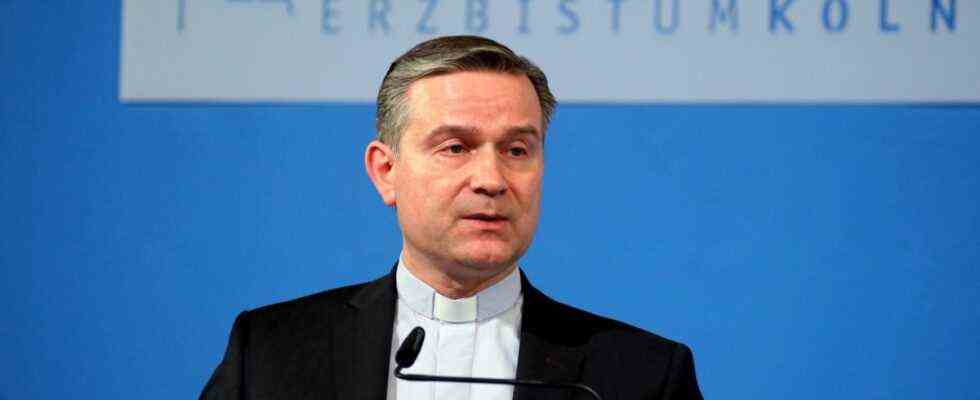It’s a generous sum: the Archdiocese of Cologne has spent a total of 2.8 million euros in the past three years for external expertise – for an abuse report, for legal reports on this report, for a second abuse report and for an agency that deals with Crisis communication deals.
These high costs, which became known over the weekend, had sparked criticism. Archbishop Cardinal Rainer Maria Woelki and his Vicar General Markus Hofmann were responsible for the awards. Now there are reasonable doubts about their approach. The awards would now be examined under canon law, informed the Archdiocese of Cologne on Tuesday evening. Previously, the Kölner Stadt-Anzeiger reported.
Accordingly, the property council and the cathedral chapter met on Tuesday evening. At this meeting, Auxiliary Bishop Rolf Steinhäuser, who as Apostolic Administrator heads the Archdiocese during Woelki’s time off, informed about indications that the two committees had not been involved in the award of the contract, as actually prescribed by canon law. He also informed the Vatican, said Steinhäuser. On this Wednesday there was also a meeting of the chief department heads in the archdiocese, but nothing was known about the content.
While Woelki is currently not in Cologne, his deputy Markus Hofmann is still working in a key position. Although his post as vicar general is suspended, he remains in office as head of administration. Hofmann asked the Prefect of the Congregation for Bishops, Cardinal Marc Ouellet, for leave of absence. But he refused. Rome wants to wait for the result of the canonical examination first.
Payment was made from the “Fund for the Needs of the Diocese”
According to the archbishopric, the money was not paid from church taxes, but from the “fund for the needs of the diocese”. But is this money earmarked? The Archdiocese of Cologne shared the Süddeutsche Zeitung on request that the fund was “a legally dependent special fund of the Archbishopric of Cologne”. It was set up by Cardinal Frings in the 1950s and “endowed with solidarity donations from priests of the archdiocese in the 1950s and 1960s”.
The purpose of the fund is the “ideal and material support for special church needs and concerns in the Archdiocese of Cologne. This is achieved in particular through the procurement and provision of funds for church institutions, projects and measures, which are usually not financed in the current budget of the Archdiocese of Cologne is provided”. The entire cost of the independent investigations had been paid from this fund.
The question that arises here is whether paying 820,000 euros to a PR agency is compatible with such a purpose, says Thomas Schüller, Professor of Canon Law at the University of Münster: “I definitely do not consider hiring a PR agency to be one ecclesiastical purpose. “
But the award procedure is also criticized: The Codex Ius Canonici (CIC), the code of Catholic church law, stipulates that a bishop, in administrative acts “which are of greater importance taking into account the financial situation of the diocese”, the asset management council and the college of consultants – in Cologne it is the cathedral chapter – must hear. In particular, this requirement of consent applies to so-called acts of “extraordinary administration”.
Canon lawyer Schüller: The episcopal chair is not a self-service shop
The bishops’ conferences of the federal states determine what falls under this. In Germany, according to a special norm from 2002, this is the “conclusion of sales and work contracts (…) as far as the value of 500,000 euros is exceeded in individual cases”. Whether legal reports and contracts with PR agencies also count as such contracts for work and services and thus require approval is now being examined. All of this becomes public just at the point in time when the reformed ecclesiastical criminal law comes into force. Financial offenses will also be punished more severely in the future – this does not apply retrospectively. But even before the legal reform, violations could be punished, said Schüller.
“As soon as possible, ideally by the end of the year”, according to the archbishopric, should be checked. According to his own statements, Schüller is not one of the canon lawyers commissioned by Auxiliary Bishop Steinhäuser. This process reminds him “strikingly of Franz-Peter Tebartz-van Elst,” says Schüller. The former bishop of Limburg also needed money for his building project “and then took it out of the thick wallet of the episcopal chair,” said Schüller. “But that’s not a self-service shop.” For Vicar General Hofmann and, in the end, Cardinal Rainer Maria Woelki, things could get tight, the church lawyer believes: “With money, Rome doesn’t have fun.”
Auxiliary Bishop Steinhäuser, who is to hold the position as administrator until Cardinal Woelki’s return at the beginning of March, has apparently been underestimated on all sides, says Schüller: “It is thanks to him that Hofmann now had to make these figures public.” A completely different mood prevails among Steinhäuser in the archdiocese, says also the qualified theologian Maria Mesrian, spokeswoman for Maria 2.0 in Cologne. “Full-time employees talk about the respectful atmosphere in which they talked. That says it all when people are happy that they are treated with respect.”

